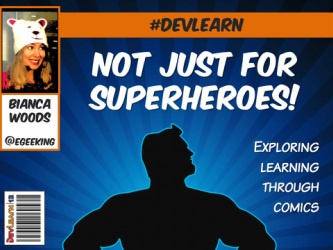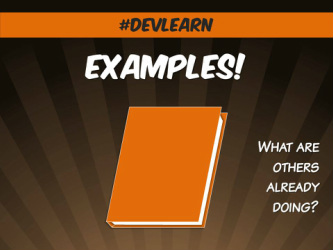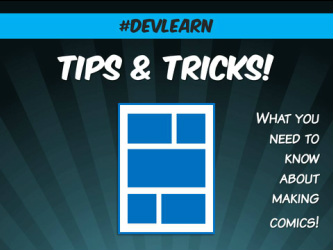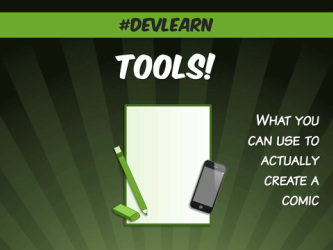Not Just For Superheroes: Exploring Learning Through Comics
Additional Resources
During my presentation I referenced a number of resources that you can use to learn more about graphic design basics. To make your life easier, I've collected them all here.
The Actual Slide Deck

Click here to download a copy of the slide deck I used for this presentation:
- PowerPoint
- Keynote
- In order to view this deck properly, you'll need to download and install two free custom fonts: Komika Axis and Komika Text. If you need help installing these fonts, here are some easy to follow tutorials for Mac and Windows.
Examples

Interested in checking out the comics and graphic novels I mentioned in this presentation? Here's links to all of them (plus a few bonus recommendations as well).
Simplifying Existing Content
Step-By-Step Tutorials
Comics As Textbooks/Explanations
Non-Fiction Narratives
General Recommendations
Simplifying Existing Content
- The Long Tail by Chris Anderson and Shane Clester. Here are links to it in the US, Canada, and UK Amazon stores.
- The Five Dysfunctions of a Team by Patrick Lencioni and Kensuke Okabayashi. Here are links to it in the US, Canada, and UK Amazon stores.
- A Cartoonist's Advice a short comic from Gavin Aung Than's series Zen Pencils. This particular comic retells part of a speech by Bill Watterson, creator of Calvin and Hobbes. It can be viewed for free here.
Step-By-Step Tutorials
- Want to see more examples of Ikea instruction manuals? They have all the current manuals available to view/download here.
Comics As Textbooks/Explanations
- Understanding Comics by Scott McCloud. Here are links to it in the US, Canada, and UK Amazon stores.
- McCloud also authored two other graphic novels you should check out. The first is Reinventing Comics, a continuation of the themes in Understanding Comics (Here are links to it in the US, Canada, and UK Amazon stores). The second is Making Comics, an illustrated guide to actually creating your own comics (Here are links to it in the US, Canada, and UK Amazon stores).
- The Adventures of Johnny Bunko by Dan Pink and Rob Ten Pas. Here are links to it in the US, Canada, and UK Amazon stores.
- The Manga Guide To... is a series of instructional comics on science and math topics. You can brows a search of these titles here in the US, Canada, and UK Amazon stores.
- While not devoted entirely to explanations, XKCD by Randall Munroe is a web comic that occasionally veers into humourous explanations of topics like math, science, logic, and computer programming. Here are a few great recent examples: Increased Risk, Insight, Interstellar Memes, Birds and Dinosaurs, and Lakes and Oceans.
- Another comedy webcomic that occasionally dabbles in explanations is The Oatmeal by Matthew Inman. This comic is particularly well known for it's hilarious (and not always safe for work) comics on grammar. Here are a few good examples.
Non-Fiction Narratives
- Maus by Art Spiegelman. Here are links to it in the US, Canada, and UK Amazon stores.
- Persepolis by Marjane Satrapi. Here are links to it in the US, Canada, and UK Amazon stores.
- Feynman by Jim Ottaviani and Leland Myrick. Here are links to it in the US, Canada, and UK Amazon stores.
General Recommendations
- There are a ridiculous amount of webcomics out there of widely varying content and quality. The site Webcomics Worth Wreading (Yep. The "w" in "Wreading" isn't a typo) does regular reviews of some of the best webcomics out there. It's a great resource for finding new titles.
- Ever wonder how independent comic artists make a living? This comic from C. Spike Trotman will answer a lot of your questions and more.
Tips and Tricks

- If you're looking for even more tips about making comics, try the site Comics For Beginners. They're currently creating YouTube videos that walk you through the comic creation process step-by-step in an easy to follow manner. They've also included some excellent resources (such as comic page and character design templates) on their Free Tools tab.
- Still getting used to actually reading comics? Try reading this handy beginner's guide.
Tools

- Apps: I personally like ComicBook! quite a lot. It's the app I used for many of the images in this presentation. The effects are easy to use and the app itself is straightforward once you get used to it. Another app you might want to check out is Manga Camera (here's the link for iOS and Android). I don't enjoy using it as much as ComicBook!, but it's still worth checking out seeing as how it's free. If you want something with a bit more depth, then an app/software combo you might want to take a look at is Comic Life. It's like a more robust version of ComicBook!, and comes in Mac, Windows, and iOS options.
- Webservices: If you're looking to put together a customizable comic without drawing a single line, Bitstrips is a great option. Ignore the admittedly crummy launch page and actually start making characters. It's amazing how varied a cast of characters you can make. The real magic happens when you port them into a strip and realize you can completely manipulate their poses. Yet again, your options are nearly endless.
- Draw Your Own: If you're planning to draw your own comics, there's no harm in going low tech and simply using pencils, pens, and paper. If you'd rather go digital, though, and are just getting started, then I recommend a tablet with a good drawing app and a decent stylus. I tend to like the app Paper, which makes drawing on the iPad delightfully simple. As for a stylus, the best bang-for-your-buck drawing stylus I've ever used is the Jot Pro. The stylus has a stabilizer on the tip that makes it so much easier to draw non-shaky lines. It's well worth the $30 it costs and no one I've recommended it to has regretted buying it.
- Professional Software: If you're comfortable with drawing software, then Photoshop CC is one option for creating comics that many artists use. It's a bit pricey, though, at about $20 a month for a subscription these days. A cheaper option, all be it one that's focused solely on drawing, is Manga Studio. This software was created specifically for the needs of digital comics and artwork. A basic copy starts at $80, but goes on sale quite often (as I write this it's currently marked down to $47.99).
- Fonts: Planning to go digital with your comic lettering? Then it's worth investigating fonts other than the ones pre-installed on your computer. For free options, check out the comic-style options from Font Squirrel. If you have a bit of a budget, consider also checking MyFonts as well for paid options.

This work is licensed under a Creative Commons Attribution-NonCommercial-ShareAlike 3.0 Unported License.
